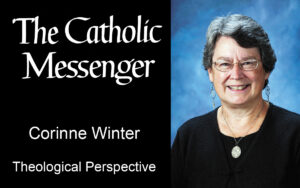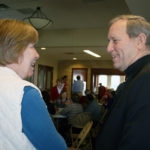By Corinne Winter
The Gospel for the Solemnity of the Ascension — celebrated this year on Sunday, June 2 — provides a dramatic and energizing scene. Jesus has gathered his followers. Before disappearing from their midst, he gives them a final exhortation to teach all nations, making disciples and baptizing in the name of the Father, Son and Holy Spirit. Painters, poets and movie makers have been drawn to the story. It stirs the imagination. What did it look like? What would the disciples have felt? What might they have said to one another?
 More importantly, the church treasures this account. The words of Jesus are often called “the great commission.” They capture our understanding of what it means to follow Christ and of what the church is all about. They stir up zeal. We will evangelize. That is our calling.
More importantly, the church treasures this account. The words of Jesus are often called “the great commission.” They capture our understanding of what it means to follow Christ and of what the church is all about. They stir up zeal. We will evangelize. That is our calling.
Interestingly, leading up to the Sunday solemnity, we have been reading from the Acts of the Apostles stories that portray carrying out that commission as having been marked by struggles from the very beginning. We see the disciples facing rejection and persecution. We see them having to figure out how to explain Jesus’ teaching among diverse peoples. They even have debates among themselves. How can the needs of all widows be met fairly? What is the relationship between the Law of Moses and membership in the Christian community?
Both locally and worldwide we as church continue to struggle. How do we respond to the needs and challenges of this time? How do we speak the Word of God to those who are bombarded by so many messages? How do we worship and work together when our views of the world and even of the church and its liturgy seem to be driving us apart? How do we deal with the fact that members, including leaders of the church, are manifestly capable of error and sin?
It is a temptation to give up. Either to walk away or to hide among a small safe group where we all agree. But our very existence as the church attests that earlier disciples have not done that. They have disagreed. They have made mistakes. (We are not including here the teaching of dogmatic truths.) There have even been divisions. And the church persists.
In the Gospel account, Jesus provides one assurance: “I will be with you.” In other accounts found, for example, in the Gospel of John which we have been reading, his assurance takes the form of the promise of the Spirit. The Pentecost account which we will hear in another week offers another vivid account of the disciples experiencing the Spirit’s presence.
We may think it would be great if the presence of Christ in the Holy Spirit took a more concrete form, thus making everything clear. No more questions or disagreements. Clear evidence that all members of the church were living holy lives and had the answers to the world’s questions and challenges. But that is apparently not the way God works. Having created us with gifts of intellect and will, God calls us to make use of those. We must enter into dialogue, discernment and prayer. We must “reach across the aisle” in church as much as in politics. We must risk making mistakes and acknowledge them when we do so. We must make a commitment to ongoing conversion as individuals and as a community.
The councils of the church provide examples of the church’s ongoing effort to fulfill its calling. This is illustrated especially in the history of Vatican II since it was called to address church renewal rather than to counter any specific heresy or outside threat. Since Vatican II, a number of bishops’ synods have addressed specific issues in the life of the church. Locally, Vision 20/20 is our effort to grow according to the commission of Christ.
It isn’t easy. It never will be, at least in this world, and it apparently never was. I forget exactly which theologian once said, “The church has always been a mess!” I see in the stories from the church’s history evidence that many have so believed in the message of Christ that they undertook the struggle to participate in Christ’s work as he called them to do.
(Corinne Winter is a professor-emerita of St. Ambrose University, Davenport.)











